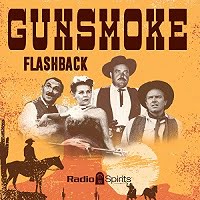
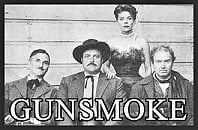 Gunsmoke (April 26, 1952-June 18, 1961) aired “Flashback” on June 27, 1953 as the 62nd of its 480 original episodes. This is but the second episode of Gunsmoke we’ve showcased here, the first coming in early January of this year. Thus, a reprise from that initial offering of some of the history and background of this excellent radio program is in order for newcomers.
Gunsmoke (April 26, 1952-June 18, 1961) aired “Flashback” on June 27, 1953 as the 62nd of its 480 original episodes. This is but the second episode of Gunsmoke we’ve showcased here, the first coming in early January of this year. Thus, a reprise from that initial offering of some of the history and background of this excellent radio program is in order for newcomers.
The show took place during the post-Civil War era (circa 1870) in Dodge City, Kansas during the expansion and settling of the Old West. On radio William Conrad (1920-1994, photo lower left) played Marshal Matt Dillon. On television Marshal Dillon was played by James Arness. On radio Parley Baer (1914-2002) played Dillon’s “assistant” Chester Wesley Proudfoot. On television Chester was played for the first couple of years by Dennis Weaver. On television, Chester’s last name was changed from Proudfoot to Goode. On radio Howard McNear (1905-1969) played Dr. Charles Adams. On television Doc was played by Milburn Stone. On radio Miss Kitty was played by Georgia Ellis (1917-1988, photo lower right). On television Miss Kitty was played by Amanda Blake. While the radio program ran for a solid 10 years (1952-61), the television program ran for 20 years (1955-75) and overlapped with its still airing counterpart on radio, and until programs airing after the television show’s demise, television’s Gunsmoke ranked as the longest running original live action (as opposed to animated) show of all time.
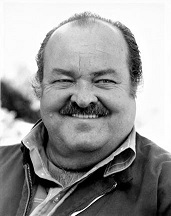
 As to the origin of Gunsmoke on radio, the story goes that in the late 1940s legendary CBS chairman William S. Paley, who was a fan of the Philip Marlowe detective series on radio, asked the head of programming to develop “a hardboiled Western” about a Marlowe of the Old West. Though an attempt was made, complications arose and the project was shelved. Enter producer Norman MacDonnell and writer John Meston a few years later, who discovered the shelved project while in the process of creating an adult Western of their own for radio (in contrast to radio westerns such as The Lone Ranger or The Cisco Kid, who were aimed primarily at a younger audience).
As to the origin of Gunsmoke on radio, the story goes that in the late 1940s legendary CBS chairman William S. Paley, who was a fan of the Philip Marlowe detective series on radio, asked the head of programming to develop “a hardboiled Western” about a Marlowe of the Old West. Though an attempt was made, complications arose and the project was shelved. Enter producer Norman MacDonnell and writer John Meston a few years later, who discovered the shelved project while in the process of creating an adult Western of their own for radio (in contrast to radio westerns such as The Lone Ranger or The Cisco Kid, who were aimed primarily at a younger audience).
Gunsmoke on radio was a critical and popular success, noted for its realism and willingness to tackle adult and/or explicit subject matter such as opium addiction, scalpings, and massacres among other adult situations and themes (Marshal Dillon, having saved a prostitute from rapists in one episode, was yet unable to dissuade her from her chosen profession). The show was not all dark and somber, however, and evolved over time into a genuinely warm and sometimes humorous “celebration of human nature.” To reinforce the realism of the excellent scripts and often times gritty subject matter, the show also rose above others due to its special effects, which brought the listener even deeper into a dusty, crowded, Dodge City, where children could be heard playing a block away, or a dog barking nearby. It was a total immersive experience for radio, and solidified the claim of the program as the first truly adult Western series on radio.
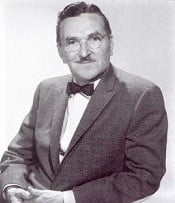
 Those familiar with the original The Andy Griffith Show (1960-68) on television will recognize the names of Parley Baer (photo at left) and Howard McNear (photo at right). They would find themselves teamed up again as they were on radio’s Gunsmoke, with Baer playing the character of Mayberry Mayor Roy Stoner, and with McNear playing Floyd the Barber. Sometime shortly after he was cast as this recurring character McNear had a stroke, almost completely paralyzing the left side of his body. He took more than a year off, but when asked by Andy Griffith to return he rejoned the cast in 1964, though camera angles and his poses had to be adjusted for. His condition deteriorated so much that after time he could no longer remember his lines. Frustrated, McNear left the show in 1967. He passed away from complications of pneumonia following another stroke on January 3, 1969. Parley Baer, his longtime friend from both Gunsmoke on radio and The Andy Griffith Show on television, read his eulogy.
Those familiar with the original The Andy Griffith Show (1960-68) on television will recognize the names of Parley Baer (photo at left) and Howard McNear (photo at right). They would find themselves teamed up again as they were on radio’s Gunsmoke, with Baer playing the character of Mayberry Mayor Roy Stoner, and with McNear playing Floyd the Barber. Sometime shortly after he was cast as this recurring character McNear had a stroke, almost completely paralyzing the left side of his body. He took more than a year off, but when asked by Andy Griffith to return he rejoned the cast in 1964, though camera angles and his poses had to be adjusted for. His condition deteriorated so much that after time he could no longer remember his lines. Frustrated, McNear left the show in 1967. He passed away from complications of pneumonia following another stroke on January 3, 1969. Parley Baer, his longtime friend from both Gunsmoke on radio and The Andy Griffith Show on television, read his eulogy.
“Flashback” would seem to be a prime example of what CBS chairman William S. Paley originally envisioned when, in the late 1940s, he commissioned his head of radio programming to create “a hardboiled western” in the mold of a Philip Marlowe detective series. As noted above, complications prevented the program from being completed at that time, but later was resurrected by famed producer Norman MacDonnell. “Flashback” fits the hardboiled mystery format in that there is a murder, but when multiple suspects claim to have committed the act, it is up to Marshal Dillon to figure out “whodunit.” I must admit that I thought I had it figured out…twice, but veteran radio scripter Les Crutchfield’s (1916-1966) skill at anticipating and then toying with listener expectations proved too much for me and, by story’s end, made for a satisfying episode. So take a listen to “Flashback” and see if you can deduce the killer on your first guess.
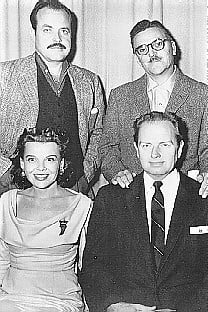
Play Time: 29:58
{Exactly a month to the day when this Gunsmoke episode aired the Korean War would officially come to an end when an armistice was signed. That meant–among other things–that soldiers would be coming home to their families. In many cases, this meant a loss of revenue for the neighborhood gang, for there would then be fewer lawns to be mowed as husbands and fathers would resume their traditional roles of keeping the grass cut and the hedges trimmed. But all this would be a month in the future, and the neighborhood gang had extra lawn mowing money burning holes in their pockets just waiting to be spent on their favorite pulp magazines. Having acquired all of their usual SF/F pulps for June they turned to another genre with action-packed stories of Good Guys vs. Bad Guys, the western. Quite coincidentally, there happened to be this new magazine at their local newsstand, something titled Gunsmoke (1953-53). It looked promising but evidently not enough readers saw it because it folded with its second issue. For its sole pair of issues it had a bi-monthly schedule. Max Brand’s Western Magazine (1949-1954) traded on the popular author’s western stories. Max Brand was the pen name of Frederick Schiller Faust (1892 –1944). Brand is probably most remembered for creating the fictional character of Dr. Kildare, which young doctor’s exploits were followed in numerous pulp stories, in several Hollywood films, on radio, TV, and in comic books. Max Brand’s Western Magazine was a bi-monthly in 1953. Texas Rangers (1936-1958) proved that with the right formula it could gather and hold a large and faithful readership for more than 20 years, quite a feat in the pressure cooker of the magazine business. From 1946-58, the last half of its long run, it not only had survived the war paper shortage and the dying off of many another pulp magazine in the early 1950s, it expanded its long-running bi-monthly schedule to that of a monthly. It must have been doing something right.}
[Left: Gunsmoke, June 1953 – Center: Max Brand’s Western, July 1953 – Right: Texas Rangers, June 1953}
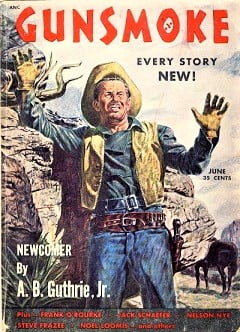
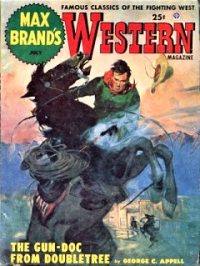
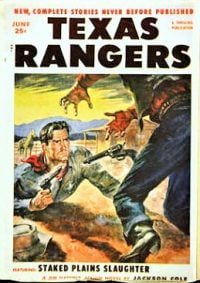
To view the entire list of weekly Old Time Radio episodes at Tangent Online, click here.